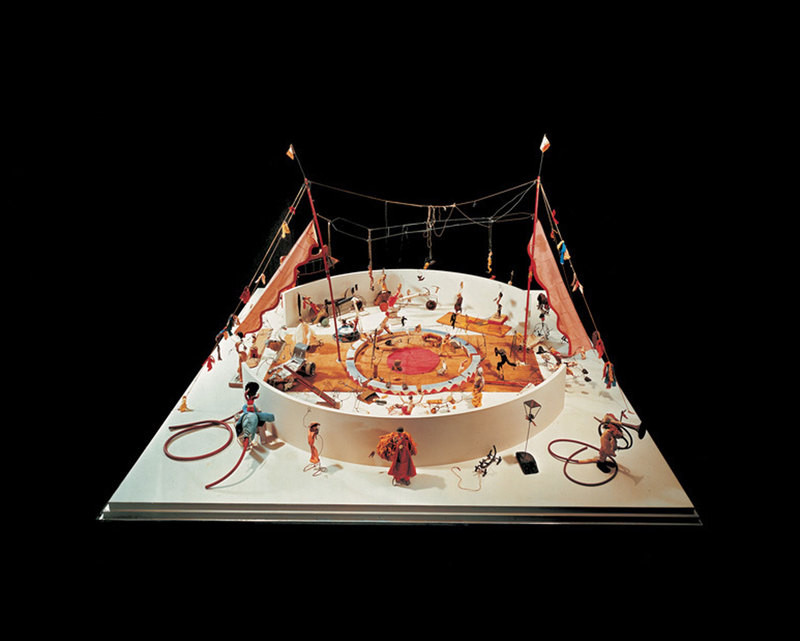Collecting Calder
17 Jul - 19 Oct 2014

Alexander Calder
Calder’s Circus, 1926–31
Wire, wood, metal, cloth, yarn, paper, cardboard, leather, string, rubber tubing, corks, buttons, rhinestones, pipe cleaners, and bottle caps
54 × 94 1/4 × 94 1/4 in. (137.2 × 239.4 × 239.4 cm) overall, dimensions variable
Whitney Museum of American Art, New York; purchase with funds from a public fundraising campaign in May 1982. One half the funds were contributed by the Robert Wood Johnson Jr. Charitable Trust. Additional major donations were given by The Lauder Foundation, the Robert Lehman Foundation Inc., the Howard and Jean Lipman Foundation Inc., an anonymous donor, The T. M. Evans Foundation Inc., MacAndrews & Forbes Group Incorporated, the DeWitt Wallace Fund Inc., Martin and Agneta Gruss, Anne Phillips, Mr. and Mrs. Laurance S. Rockefeller, the Simon Foundation Inc., Marylou Whitney, Bankers Trust Company, Mr. and Mrs. Kenneth N. Dayton, Joel and Anne Ehrenkranz, Irvin and Kenneth Feld, Flora Whitney Miller. More than 500 individuals from 26 states and abroad also contributed to the campaign 83.36.1-95. © 2009 Calder Foundation, New York / Artists Rights Society (ARS), New York; photograph © Whitney Museum of American Art.
Calder’s Circus, 1926–31
Wire, wood, metal, cloth, yarn, paper, cardboard, leather, string, rubber tubing, corks, buttons, rhinestones, pipe cleaners, and bottle caps
54 × 94 1/4 × 94 1/4 in. (137.2 × 239.4 × 239.4 cm) overall, dimensions variable
Whitney Museum of American Art, New York; purchase with funds from a public fundraising campaign in May 1982. One half the funds were contributed by the Robert Wood Johnson Jr. Charitable Trust. Additional major donations were given by The Lauder Foundation, the Robert Lehman Foundation Inc., the Howard and Jean Lipman Foundation Inc., an anonymous donor, The T. M. Evans Foundation Inc., MacAndrews & Forbes Group Incorporated, the DeWitt Wallace Fund Inc., Martin and Agneta Gruss, Anne Phillips, Mr. and Mrs. Laurance S. Rockefeller, the Simon Foundation Inc., Marylou Whitney, Bankers Trust Company, Mr. and Mrs. Kenneth N. Dayton, Joel and Anne Ehrenkranz, Irvin and Kenneth Feld, Flora Whitney Miller. More than 500 individuals from 26 states and abroad also contributed to the campaign 83.36.1-95. © 2009 Calder Foundation, New York / Artists Rights Society (ARS), New York; photograph © Whitney Museum of American Art.
COLLECTING CALDER
17 July – 19 October 2014
The Whitney’s collection is the largest repository of Alexander Calder’s work in the world. Collecting Calder, one of two permanent collection displays on the Museum’s fifth-floor mezzanine, presents a selection of Alexander Calder sculptures and drawings, giving equal focus to the two major aspects of the artist’s oeuvre: Calder’s Circus and his later work in abstraction. For the former, Calder employed ordinary materials—wire, string, cork, wood, paper, bits of metal, and cloth—to create a miniature circus, whose acts he staged for friends and patrons as narrator and puppeteer between 1926 and 1931. His later mobiles, inspired in part by his visit to Piet Mondrian’s studio in 1930, use an ingenious system of weights and counterbalances that allowed each piece’s suspended parts to move in response to air currents, retaining the movement of the circus performances. A selection of these works are also on view along with a group of the artist’s stabiles, or static sculptures.
Collecting Calder is organized by Barbara Haskell, Curator.
17 July – 19 October 2014
The Whitney’s collection is the largest repository of Alexander Calder’s work in the world. Collecting Calder, one of two permanent collection displays on the Museum’s fifth-floor mezzanine, presents a selection of Alexander Calder sculptures and drawings, giving equal focus to the two major aspects of the artist’s oeuvre: Calder’s Circus and his later work in abstraction. For the former, Calder employed ordinary materials—wire, string, cork, wood, paper, bits of metal, and cloth—to create a miniature circus, whose acts he staged for friends and patrons as narrator and puppeteer between 1926 and 1931. His later mobiles, inspired in part by his visit to Piet Mondrian’s studio in 1930, use an ingenious system of weights and counterbalances that allowed each piece’s suspended parts to move in response to air currents, retaining the movement of the circus performances. A selection of these works are also on view along with a group of the artist’s stabiles, or static sculptures.
Collecting Calder is organized by Barbara Haskell, Curator.
